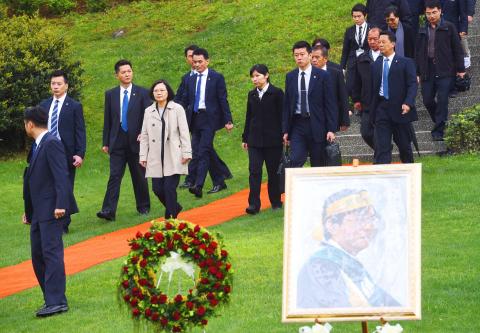President Tsai Ing-wen (蔡英文) yesterday stressed the importance of transitional justice, saying that it is the most important step following the democratization of Taiwan.
It is important the nation gets transitional justice right, Tsai said at an event hosted by the Deng Liberty Foundation at Chinpaoshan Cemetery (金寶山) in New Taipei City to commemorate democracy activist Deng Nan-jung (鄭南榕).
“While the world already associates Taiwan with democracy, there is one missing element, namely achieving transitional justice,” she added.

Photo: Peter Lo, Taipei Times
“The process — which is rooted in uncovering the truth, taking responsibility and social reconciliation — is one her administration has long championed,” she added.
The Legislative Yuan passed the Act on Promoting Transitional Justice (促進轉型正義條例) in December last year. It requires the government to set up a committee to implement transitional justice measures.
The first thing the transitional justice promotion committee would do once established is research what happened when the then-Chinese Nationalist Party (KMT) regime governed the nation under martial law from 1945 until 1992, Tsai said.
The appointed committee nominees are to undergo legislative review before their confirmation.
The committee measures up to the transitional justice teams of other nations, Tsai said, adding that she looks forward to lawmakers’ support of its members.
“Whether Taiwan could be a democratic nation was something Deng cared about deeply,” Tsai said, adding that he would likely find it comforting knowing that Taiwan was ranked among the world’s “free” nations this year in Freedom House’s annual report, in which Taiwan garnered an aggregate score of 93 out of 100, up two points from last year.
On April 7, 1989, Deng, then editor-in-chief of Freedom Era Weekly (自由時代週刊), set himself alight as heavily armed police attempted to break into his office following 71 days of self-imposed isolation after he was charged with sedition for the stance his magazine took against the government after it published a draft Taiwan Republic Constitution in 1988.
In 2016, the Executive Yuan declared April 7 Freedom of Expression Day to commemorate Deng’s death.

MAKING WAVES: China’s maritime militia could become a nontraditional threat in war, clogging up shipping lanes to prevent US or Japanese intervention, a report said About 1,900 Chinese ships flying flags of convenience and fishing vessels that participated in China’s military exercises around Taiwan last month and in January last year have been listed for monitoring, Coast Guard Administration (CGA) Deputy Director-General Hsieh Ching-chin (謝慶欽) said yesterday. Following amendments to the Commercial Port Act (商港法) and the Law of Ships (船舶法) last month, the CGA can designate possible berthing areas or deny ports of call for vessels suspected of loitering around areas where undersea cables can be accessed, Oceans Affairs Council Minister Kuan Bi-ling (管碧玲) said. The list of suspected ships, originally 300, had risen to about

DAREDEVIL: Honnold said it had always been a dream of his to climb Taipei 101, while a Netflix producer said the skyscraper was ‘a real icon of this country’ US climber Alex Honnold yesterday took on Taiwan’s tallest building, becoming the first person to scale Taipei 101 without a rope, harness or safety net. Hundreds of spectators gathered at the base of the 101-story skyscraper to watch Honnold, 40, embark on his daredevil feat, which was also broadcast live on Netflix. Dressed in a red T-shirt and yellow custom-made climbing shoes, Honnold swiftly moved up the southeast face of the glass and steel building. At one point, he stepped onto a platform midway up to wave down at fans and onlookers who were taking photos. People watching from inside

Japan’s strategic alliance with the US would collapse if Tokyo were to turn away from a conflict in Taiwan, Japanese Prime Minister Sanae Takaichi said yesterday, but distanced herself from previous comments that suggested a possible military response in such an event. Takaichi expressed her latest views on a nationally broadcast TV program late on Monday, where an opposition party leader criticized her for igniting tensions with China with the earlier remarks. Ties between Japan and China have sunk to the worst level in years after Takaichi said in November that a hypothetical Chinese attack on Taiwan could bring about a Japanese

The WHO ignored early COVID-19 warnings from Taiwan, US Deputy Secretary of Health and Human Services Jim O’Neill said on Friday, as part of justification for Washington withdrawing from the global health body. US Secretary of State Marco Rubio on Thursday said that the US was pulling out of the UN agency, as it failed to fulfill its responsibilities during the COVID-19 pandemic. The WHO “ignored early COVID warnings from Taiwan in 2019 by pretending Taiwan did not exist, O’Neill wrote on X on Friday, Taiwan time. “It ignored rigorous science and promoted lockdowns.” The US will “continue international coordination on infectious